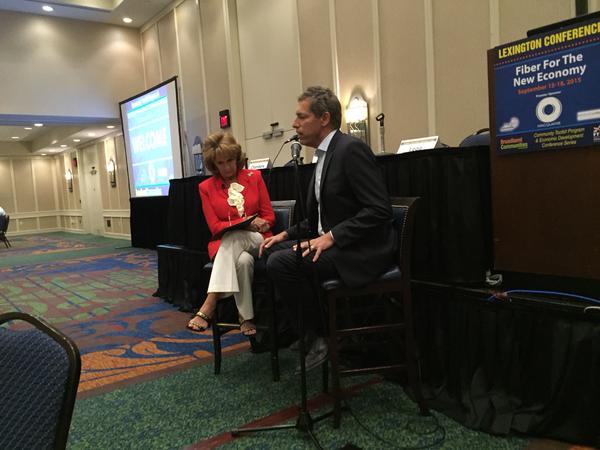
Drew Clark, Publisher, BroadbandBreakfast.com
LEXINGTON, Kentucky, September 16, 2015 – Fiber-optics is now the default mode for deploying high-speed internet throughout the country, even including rural areas, said the head of the Federal Communications Commission‘s office of strategic planning.
Everywhere the country has been able to get an electric line, it ought to be able to get a fiber cable, said Jonathan Chambers, chief of the office, widely regarded as the FCC think tank for technological advancement.
Chambers, in the kick-off presentation at the Broadband Communities economic development conference here, highlighted the widespread acceptance that everyone deserved broadband deployment at speeds significantly higher than even those put forward in the National Broadband Plan five years ago.
This expectation for broadband at speeds upward of 25 megabits per second (Mbps), 100 Mbps, or 1 Gigabit per second (Gbps), Chambers said, extended even to rural areas.

About Mark Milliman
Mark Milliman is a Principal Consultant at Inphotonics Research driving the adoption and assisting local governments to plan, build, operate, and lease access open-access municipal broadband networks. Additionally, he works with entrepreneurs and venture capitalists to increase the value of their intellectual capital through the creation of strategic product plans and execution of innovative marketing strategies. With more than 22 years of experience in the telecommunications industry that began at AT&T Bell Laboratories, Mark has built fiber, cable, and wireless networks around the world to deliver voice, video, and data services. His thorough knowledge of all aspects of service delivery from content creation to the design, operation, and management of the network is utilized by carriers and equipment manufacturers. Mark conceived and developed one of the industry's first multi-service provisioning platform and is multiple patent holder. He is active in the IEEE as a senior member. Mark received his B.S. in Electrical Engineering from Iowa State University and M.S. in Electrical Engineering from Carnegie Mellon University.








